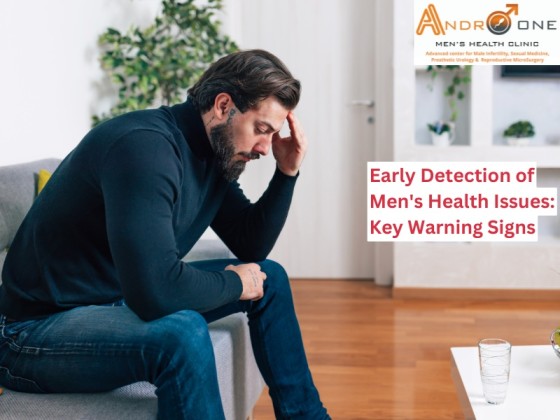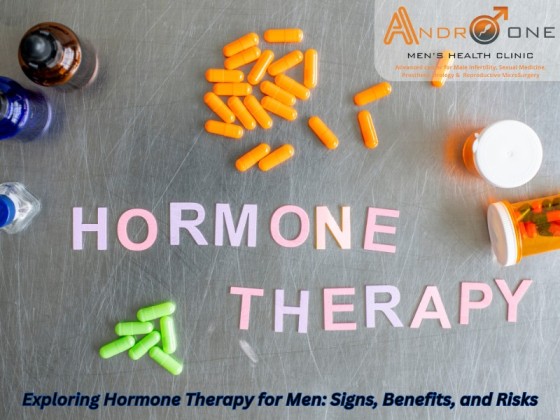Early Detection of Men’s Health Issues: Key Warning Signs
Men’s health rarely sees the kind of attention it should get. Most men will opt to ignore early warning signs of serious health problems. Early detection is one way of preventing such problems from getting worse. In this blog post, a few key warning signs shall be highlighted. Such symptoms help men identify potential health problems at their earliest stages. Common Symptoms of Men’s Health Issues Many men feel fatigue and think it’s normal. However, in such cases where the feelings persist, there could be health issues that one has not checked out. Tiredness can indicate problems with sleep disorders and even depression and heart conditions. If you’re always experiencing tiredness, it’s time to see a doctor. The other area that indicates a problem might be one with weight changes. Therefore, one cannot pay any heed to sudden loss or gain of weight. Such patterns may point to several health issues. For example, such might be due to thyroid troubles or diabetes and digestive disorders. So, pay attention if you witness any kind of unexplained changes in your weight. More importantly, frequent urination can be a symptom of prostate issues. Men above 40 must regularly check on the health of their prostate system. Moreover, prostate problems can be significant if left untreated. Regular checks are recommended by experts in andrology and men’s health in Tamilnadu, especially as men age. Sexual Health and Warning Signs Sexual health is one of the most important factors in men’s health. ED is also pretty common among the men. But most of them would not be willing to discuss it. However, it might be related to cardiovascular diseases, diabetes mellitus, or hormonal imbalances. If identified at an early age, it prevents much ado for later. The best sexologist in Salem can provide better sexual health treatment. Additionally, low libido can also be attributed to hormonal imbalances. Testosterone levels start to decline in men as they age. While it is a normal part of the ageing process, a rapid decrease may indicate a more serious health problem. Depression, anxiety, and even chronic illness impact sexual desire. Changes in sexual wellness should be discussed with a professional. Furthermore, testicular health is equally important. Any lumps, swelling, or pain in the testicles should not be taken lightly. These can be early signs of testicular cancer, most common in young men. A case of testicular issues can dramatically improve the prognosis at the time of detection. Mental Health and Its Impact Mental health is an essential feature of human life. However, the sad truth about it is that men hardly feel comfortable talking about issues related to their mental health. Depression, stress, and anxiety are characteristic of the male psyche. These mental disorders can manifest in the body as a headache, fatigue, or digestive problems. Moreover, continuous feelings of sadness or loss of interest in activities can be a sign of depression. These feelings should be addressed early. The best andrologist in Namakkal can guide men to proper mental health care if needed. Additionally, such problems may be brought about by an anxiety disorder. For example, lack of sleep, frequent headaches, and rapid heartbeats. Therefore, one suffering from an anxiety disorder tends to ignore symptoms to such an extent that it worsens both the mental and physical conditions progressively. It is, therefore, important to discuss mental health concerns before they escalate to beyond tolerance. Digestive Issues and Men’s Health Digestive problems are another warning sign one should not brush off. Most men often experience heartburn or indigestion daily and dismiss it as inconsequential. Chronic digestive problems can refer to gastrointestinal issues. Such problems include conditions such as ulcers or even more dangerous diseases such as colon cancer. Furthermore, changes in bowel habits can also occur for no apparent reason and should prompt concern. Diarrhoea, constipation, and even blood in the stool should never be treated with a callous attitude. Such symptoms can mean a case of bowel troubles or other digestive disorders. Early detection helps to make big differences in how to better manage digestive health issues. Cardiovascular Health and Early Signs Heart disease is the leading cause of death among men globally. Most men brush off the early signs and symptoms, such as chest pain or shortness of breath, but the signs may be cardiovascular-related conditions. Additionally, high blood pressure and high cholesterol are silent killers. Many men fail to come to know when they are suffering from these conditions until it is very late. Thus, there must be regular health screenings. These early screening methods can be able to trace problems regarding the heart and stop further complications. Apart from the above, a healthy lifestyle like diet and exercise helps to maintain a healthy heart. Specialists in andrology and men’s health in Tamilnadu feel that ageing men give much importance to cardiovascular health. When to See a Doctor? It is, therefore, very essential that one knows exactly when he ought to go for medical care. If you experience some other unfamiliar symptoms, then you should seek a healthcare professional. The delay of the treatment might cause more fatal problems. Men’s sexual health clinic in Tamilnadu provide special care to those with sexual health issues. Early treatment ensures better health outcomes. Regular check-ups can also identify problems early, even when you don’t experience symptoms. Doctors can track major health indicators like blood pressure, cholesterol levels, and hormone balance. Moreover, lifestyle modifications can take away so much of the health problems. A diet in line with nutritional value, regular exercise, and management of stress are of prime importance. Avoiding smoking, as well as excessive alcohol intake, also reduces risks to a great extent. Conclusion Prevention of severe conditions in men is achieved by early warning signs of health problems. Most men take lightly early symptoms, which are signs of some form of body disease. The feeling of being unwell, changes in weight, sexual complications, and mental issues should not be taken lightly. Digestive and cardiovascular conditions will also deteriorate if treatment is not sought early. Maintaining

